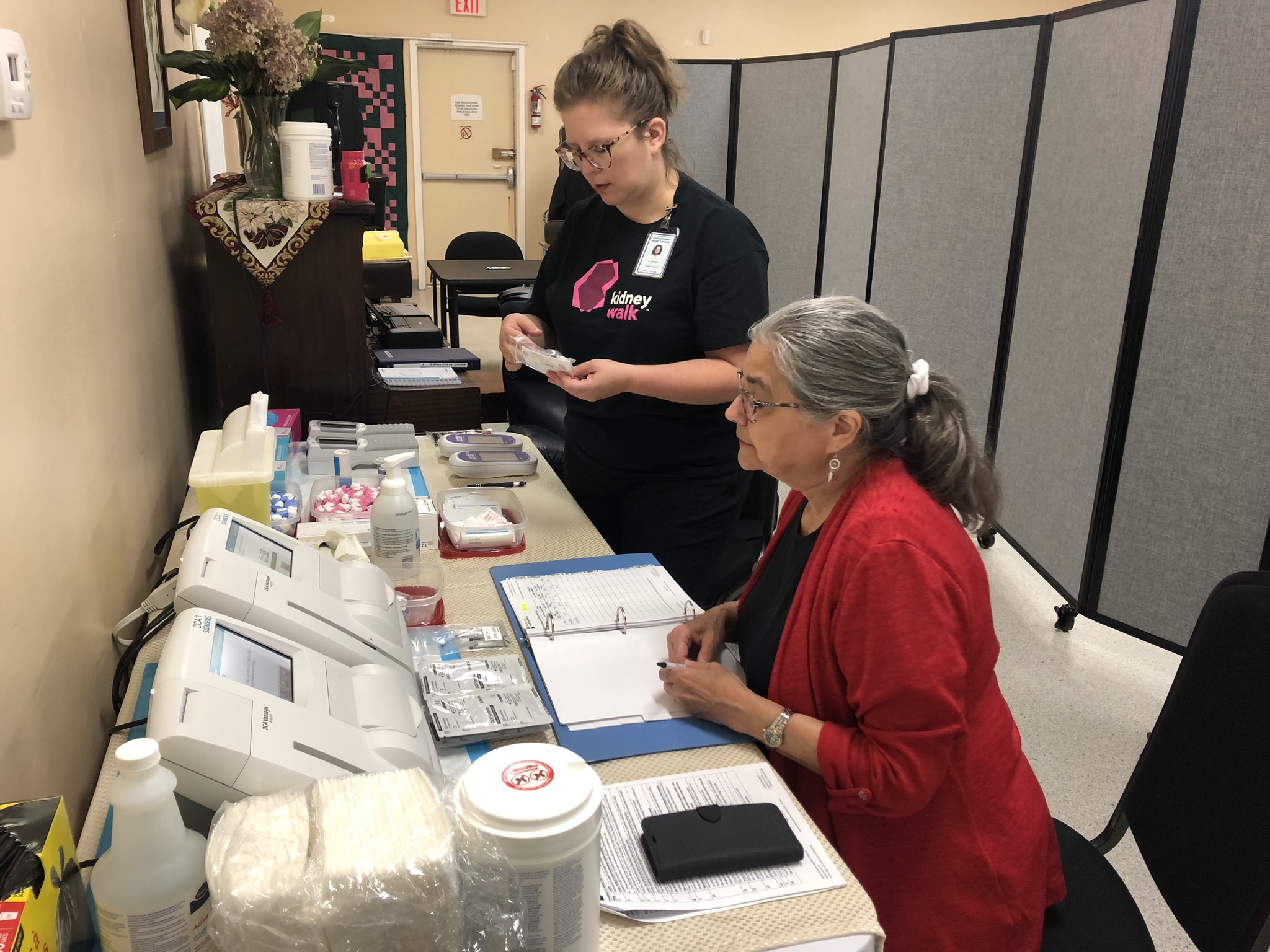Story Posted: 2024-11-18
Early Screening Programs
Carmen Levandoski – Nurse Clinician , Dr. Joanne Kappel -Nephrologist / A screening Clinic in Sepetmber 2023
The first Campaign Priority for St. Paul’s Hospital Foundation’s By Your Side Kidney Care Campaign is already in motion!
For over 40 years, St. Paul’s Hospital Foundation has been raising funds to benefit the comfort, care and experiences of patients facing a diagnosis of Chronic Kidney Disease (CKD). Donor support has helped us to realize everything from improved dialysis chairs to a new hemodialysis unit. As our Foundation considered how we might continue to impact this important area of leadership and care, we asked: What if instead of raising funds for more dialysis chairs, we focused on lowering the number of people who need to sit in them?
Kidney Check Saskatchewan is an innovative early-screening pilot program that was initiated in the fall of 2023. This pilot program is the first of its kind in Saskatchewan, and is a collaboration between St. Paul’s Hospital and Foundation, Saskatchewan Health Authority, Kidney Health Community Program (KHCP), and Lac La Ronge Indian Band and Kinistin Saulteaux Nation.
In establishing a partnership agreement and dual responsibility for the screening programs with leadership in each location, “We built upon our previous relationships with these communities,” says Dr. Joanne Kappel, a recently retired nephrologist from St. Paul’s Hospital who helped deliver the first Kidney Check clinics in the North. “Residents there strongly want to do something about the epidemic of CKD in their communities... so we asked, “What can you do? What can we do? How can we make this better?’”
This program, that aims to engage, educate and encourage individuals to prevent and self-manage Chronic Kidney Disease, is made possible by the generosity of our community.
The program is based on the following realities:
1. Indigenous Peoples are disproportionately impacted by Chronic Kidney Disease. While 1 in 10 Canadians suffer from CKD, 1 in 3 Indigenous people are currently living with the disease. Providing effective early screening programs to populations at a high risk of developing CKD is an proactive way to slow the onset of kidney failure.
2. Symptoms for CKD do not present themselves until very late in the disease’s progression. Most CKD patients will not feel significant symptoms until they have lost 70 - 90% of their kidney function. At this point in the disease, their options are limited to dialysis or receiving a kidney transplant. If individuals can better understand their personal risks for the disease and take control of their health, they can rely less on acute care facilities to manage potential illnesses and will subsequently experience better health outcomes.
3. Multiple appointments can create barriers to health. The early screening programs engage, educate, test and deliver results all in one sitting through an innovative Point of Care program. This process results in better patient participation in their own care by helping them to understand their diagnosis and treatment plan as soon as possible. When testing is complete, the screening Registered Nurse (RN) sits down with the patient and creates a personalized care plan that looks at the individual’s risk of developing end-stage kidney disease over the next five years, and at what they can do to positively impact their health. “People go away feeling that there’s something that they can do,” explains Carmen Levandoski, a Nurse Clinician with the Kidney Health Community Program who also helps deliver the Kidney Check Saskatchewan programming.
4. The sooner end-stage kidney disease is diagnosed, the better. If an individual’s CKD does progress to endstage kidney disease, receiving this diagnosis as early as possible will decrease the effects of kidney failure complications, allow dialysis to begin in a timely and accessible manner, and ensure that the person is in the best health possible to receive a kidney transplant.
5. Early detection is better for the patient and better for the system. The economic burden of CKD is substantial to patients and health care systems, and increases as the disease progresses. High rates of hospitalization, inadequate disease identification, reduced disease management, and high rates of complications are all major drivers of excess costs. We can do better. By screening and addressing CKD in its early stages, as well as increasing awareness and education, we can reduce healthcare costs and improve quality of life for our patients. Both Ms. Levandoski and Dr. Kappel highlight the importance of community health care staff and leadership in the delivery of the program, and underline that the essential partnership with individuals such as Elder Frances in La Ronge allows the Clinics to be so successful.
Through the Kidney Check program, we can help empower people to understand the risks of kidney disease, take preventative measures, and delay or prevent dialysis and the need for a kidney transplants. Our intention is to model the learnings and outcomes of this important pilot program and advocate for the provincial adoption of early screening programs for other communities in Saskatchewan whose citizens are a high risk for developing CKD. Together, we can decrease the burden of Chronic Kidney Disease and kidney failure on communities, healthcare systems, and especially individuals and their families.

